| |
| TRAVELING WITH CHILDREN |
 The
UAE is a family-oriented environment and small children
are welcome and appreciated everywhere. The larger hotels
have a good selection of kids' meals, especially in room
service. Very small children do not normally eat out at
night, but are often welcome. Phone ahead to check. In
any case baby-sitting services are available in the main
hotels. The
UAE is a family-oriented environment and small children
are welcome and appreciated everywhere. The larger hotels
have a good selection of kids' meals, especially in room
service. Very small children do not normally eat out at
night, but are often welcome. Phone ahead to check. In
any case baby-sitting services are available in the main
hotels.
There are lots of activities for children, both in and
around the five-star hotels, special amusement parks and
many green areas. Children under 12 usually qualify for
discounts on admission fees to most museums, amusement
parks, swimming pools and entertainment centres.
WOMEN TRAVELERS
The UAE is extremely safe for women travellers, nevertheless
women travelling alone are a novelty and you may find
yourself at the focus of unwanted attention. You will
probably have a more relaxed visit if you stay in one
of the four or five star hotels, especially if you can
use the hotel's private beach facilities.
Women in the UAE have a much more liberal lifestyle
than many of their Gulf counterparts (i.e. women are
permitted to drive, work etc) however, women travelers
should be aware that they are visiting a society which
has strong traditional roots.
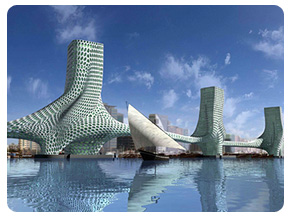 If
you wish to avoid hassle or risk causing offence, do
not wear tight or revealing clothes away from the beach
clubs and resorts. You will also find that clothing
suitable for the more cosmopolitan cities may not be
comfortable or convenient for independent travel in
rural areas. Loose trousers and a long sleeved cotton
shirt will suit a wide range of situations. If
you wish to avoid hassle or risk causing offence, do
not wear tight or revealing clothes away from the beach
clubs and resorts. You will also find that clothing
suitable for the more cosmopolitan cities may not be
comfortable or convenient for independent travel in
rural areas. Loose trousers and a long sleeved cotton
shirt will suit a wide range of situations.
When socializing in local company wait until a hand
is offered to you for a handshake, some devout Muslims
prefer not to shake hands with a woman.
Remember that one advantage of being a woman in the
UAE is that women are normally served first at banks
and post offices, police stations and other government
offices frequently have separate queues for women.
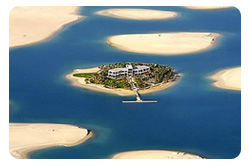 DISABLED
TRAVELERS DISABLED
TRAVELERS
Several five-star hotels have specially-adapted rooms
and other facilities for handicapped people.
The airport and major shopping malls have good access
and facilities, as well as Dubai's Transport Taxis are
fitted to accommodate wheelchairs.
There are also designated disabled parking spaces in
nearly all of the city's car parks, though you will
need a disabled window badge in order to use them
AIRPORT FACILITIES
In June 2001 Emirates airline designated a special handling
area at departures and arrivals for passengers with
special needs. As a result, wheelchair passengers will
receive a more personalized service.
|
|
|
| HEALTH |
Dubai contains well equipped public and private hospitals.
Remarkably, the UAE was one of only two countries with
no reported cases of holiday illnesses recorded in a survey
by the leading British consumer magazine, Holiday Which?
This is a tribute to the success of government immunization
programs, the provision of adequate clean water and high
standards of cleanliness in hotels and restaurants.
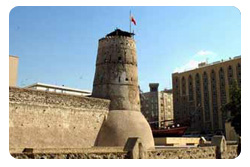 VACCINATIONS VACCINATIONS
No special immunizations are required, however it would
be wise to check beforehand if you are traveling from
a health-risk area. Tetanus inoculations are usually
recommended if you are considering a long trip. Polio
has been virtually eradicated in the UAE and hepatitis
is very rare and can be avoided by taking precautions.
Hepatitis A is transmitted by contaminated food and
water, Hepatitis B, C, D through sexual contact, the
use of unsterilized needles and blood transfusions.
MALARIA
There are very few mosquitoes in the towns and cities
and, since it is not considered to be a risk, malaria
tablets are rarely prescribed for travel in the UAE.
However, mosquitoes will find you if you are camping
near the mountains or exploring wadis or date groves
in the evening, so cover up and use a suitable insect
repellent as it is always safer to avoid being bitten.
If you are in any doubt consult your doctor or your
nearest tropical medical centre before your trip.
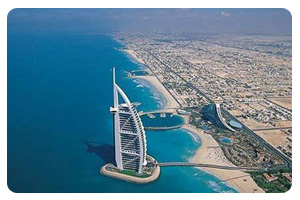 SUNBURN SUNBURN
The sun can be fierce throughout the year so heatstroke
and heat exhaustion are always a risk. Adequate sunglasses,
hats and high factor sun creams are essential, especially
for children.
HEALTH INSURANCE
Only emergency cases at the A&E Public hospitals
can be seen free of charge.
Public hospitals, where the medical facilities are very
good, will deal with emergencies free of charge, however
it would be wise to take out medical insurance to cover
all eventualities, especially if you need to attend
a private hospital or clinic where treatment can be
quite expensive. In all instances, medical procedures,
including the use of sterilized needles and the provision
of blood transfusions are very reliable.
DOCTORS
If you need a doctor, ask at your hotel, or at the General
Medical Centre, as well as ringing your embassy for
recommendations. If you need emergency treatment and
are unable to contact a doctor, try one of the major
hospitals listed below.
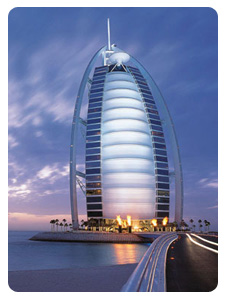 PHARMACIES PHARMACIES
Most medicines are readily available at pharmacies.
Each emirate has at least one pharmacy open 24 hours
a day. Check in local newspapers for information. In
some emirates a 24-hour municipality emergency number
(Abu Dhabi 02 777 929; Dubai 04 2232323) lists the locations
of open chemists.
DENTISTS
Good dentists are readily available, including orthodontists.
ALTERNATIVE MEDICINE
Chinese medicine is readily available. There is also
a homeopathic hospital.
Ambulance service 998 or 999
|
| |
| Main Public hospitals in Dubai |
|
Al Wasl Hospital - Qud Metha Road
New Dubai Hospital - Near the Hyatt Regency Hotel, Deira
Rashid Hospital - Oud Metha Road, Bur Dubai
Main Private hospitals in Dubai
American Hospital Dubai - Bur Dubai
Emirates Hospital - Jumeirah Beach Road
Welcare Hospital - Garhoud, Deira
|
| COMMUNICATIONS AND
MEDIA |
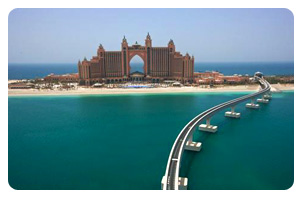 TELEPHONE
AND FAX TELEPHONE
AND FAX
The telephone network operated by the national telecommunication
organization ETISALAT is superb: local calls are free
and direct dialing is available to 150 countries. In 2006,
a rival telecommunications company, Du, was launched offering
competitive rates.
The international dial code for UAE is +971. Cheap rates
for international direct calls apply from 9 p.m. to 7
a.m. and all day on Fridays and public holidays. There
is a complete list of rates at the back of each telephone
directory. You do not need to use the emirate access code
when dialing a local number in that emirate. In other
words to ring a number in Dubai from Abu Dhabi you must
use the 04 prefix. If you are dialing a number in Abu
Dhabi from another location in that emirate you will not
need to use a prefix.
Yellow page directories are available for each emirate
(see also 'http://www.emirates.net.ae'). These can be
purchased at ETISALAT offices.
Pay phones, both card and coin operated, are located throughout
the UAE. Phone cards for local use (Dh30 or Dh45) are
usually available from ETISALAT offices, supermarkets,
pharmacies etc. Coin operated phones take Dh1 and 50 fils.
LOCAL AND INTERNATIONAL AREA
CODES:
Abu Dhabi 02 + 9712
Ajman 06 + 9716
Al Ain 03 + 9713
Dubai 04 + 9714
Fujairah 09 + 9719
Jebel Ali 04 + 9714
Khor Fakkan 09 + 9719
Ra? al-Khaimah 07 + 9717
Sharjah 06 + 9716
Umm al-Qaiwain 06 + 9716
Sharjah, Ajman and Umm al-Qaiwain share the access
code 06 and Fujairah and Khor Fakkan the access code
09
All hotels offer fax facilities. Faxes can also be sent
from ETISALAT ('http://www.etisalat.co.ae') offices
throughout the Emirates. The offices are recognizable
by the distinctive 'golf balli' structures on top of
each building.
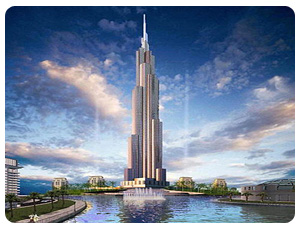 The
main ETISALAT office in Abu Dhabi is on the corner of
Zayed the Second and Sheikh Rashid bin Saeed Al Maktoum
St. It is open 24 hours a day. ETISALAT's main office
in Dubai is on the corner of Beniyas and Omar ibn Al
Khatab roads. It is also open around the clock. In Sharjah
the main office is located in Al Manakh, close to the
dhow roundabout. Opening hours are Saturday to Wednesday
7 a.m.- 3 p.m., however you can send and receive fax
and telex messages 24 hours a day. The
main ETISALAT office in Abu Dhabi is on the corner of
Zayed the Second and Sheikh Rashid bin Saeed Al Maktoum
St. It is open 24 hours a day. ETISALAT's main office
in Dubai is on the corner of Beniyas and Omar ibn Al
Khatab roads. It is also open around the clock. In Sharjah
the main office is located in Al Manakh, close to the
dhow roundabout. Opening hours are Saturday to Wednesday
7 a.m.- 3 p.m., however you can send and receive fax
and telex messages 24 hours a day.
Shops advertising typing and photocopying services often
have fax facilities.
MOBILE PHONES
GSM services are available and the mobile phone code
within the UAE is 050. "Speak Easy" is a GSM
mobile service for those visitors and tourists who cannot
use their own mobile phones in the UAE. You can either
buy a new mobile phone and purchase a temporary SIM
card or use your own handset with a temporary card.
Contact ETISALAT for details.
INTERNET
Most five-star hotels offer guests internet access.
Email cheap rates are from 7 p.m. to 7 a.m. At the time
of writing public internet access kiosks were being
established in the UAE, initially at the major airports.
The minimum charge for public access is Dh2 and 60 fils
per minute. Payment can be made by credit card.
If you have brought your laptop with you, along with
a modem and browsing software, you can dial 500 5333
to get connected to the internet. A charge of 15 fils
per minute is billed to the telephone to which you are
connected. For more details call 800 5244.
POST
The General Postal Authority runs an efficient postal
system with red post collection boxes dotted throughout
the cities and towns. Mail is usually collected morning
and evening. Stamps can be purchased and post mailed
from your hotel. Express postal facilities are also
available at post offices.
In general, post office opening hours are from 8 a.m.-
1 p.m. and 4 p.m. - 7 p.m. Saturday to Wednesday. Closed
Thursdays and Fridays. 8 a.m. - 12 noon on Public Holidays,
but closed on the first day of Eid holidays. Note that
there are no telephone or fax facilities at post offices
in the UAE and poste restante facilities are not available.
The main post office in Dubai is on Za?sabeel Road,
Bur Dubai (8 a.m. - 11.30 p.m. Saturday to Wednesday,
8 a.m. - 1 p.m. and 4 p.m. - 8 p.m. Thursday and closed
Fridays). There is also a smaller post office in Deira
on Al Sabkha Road. Other post offices are located in
Satwa, Karama and Jumeirah.
|
| OPENING HOURS
AND HOLIDAYS |
Normal shopping hours are from 9.00 a.m. - 1 p.m. and
4.00 - 9.00 p.m. however many shops, particularly in Dubai
and Abu Dhabi stay open all day. Most shopping centres
open from 10 a.m to 10 p.m - frequently later. Some supermarkets
are open for 24 hours. Although shops and shopping centres
are fully air conditioned, the cool of the evening is
a favourite time for shopping. Shopping centres and most
shops are open on Friday, the Islamic day of rest, but
they all close for Juma (Friday) prayers from 11.30 a.m.
to 1.30 p.m.
All shops are required to close at prayer times in Ra?'s
al-Khaimah.
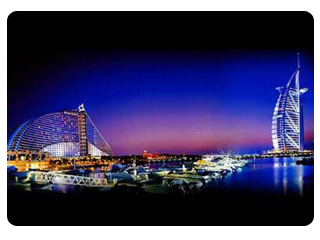 OFFICES OFFICES
Government offices open at 7.30 a.m. and close at 3.00
p.m. but you would be wise to visit in the morning.
Private offices tend to keep longer hours, coming back
to work in the evening after an extended mid-day break.
Some private businesses open from 8 a.m. to 5 p.m. All
government offices close for the weekend at mid-day
on Thursday and do not open again until Saturday morning.
Some offices outside the public sector are open on Thursday
and close on Friday and Saturday.
PUBLIC HOLIDAYS
Since Muslim festivals are timed according to local
sightings of phases of the moon, the dates outlined
below for Islamic religious holidays are approximate.
The precise dates are not announced until a day or so
before they occur. If a public holiday falls on a weekend,
the holiday is usually taken at the beginning of the
next working week.
A three-day mourning period is usually announced when
a member of the ruling families or a government minister
or the head of a neighbouring state dies. Government
offices and some private companies will close for the
period.
1 Jan New Year's Day.
2 Dec National Day.
Al-Hijra (Islamic New Year).
Mouloud (Birth of the Prophet).
Leilat al-Meiraj (Ascension of the Prophet).
Eid al-Fitr (End of Ramadan).
Eid al-Adha (Feast of the Sacrifice).
|
| SECURITY |
PERSONAL SAFETY
The UAE is one of the safest places in the world to visit.
In fact, it has been designated the world's safest holiday
destination by the international travel industry on two
occasions. Nevertheless, it is a good idea to take out
travel insurance and to take the normal precaution to
safeguard yourself and your valuables.
Police Headquarters Abu Dhabi 02 4461461
Dubai 04 2292222
Sharjah 06 5631111
Ajman 06 7436000
Umm al-Qaiwain 06 5656662
Ras al-Khaimah 07 2333888
Fujairah 09 2370000
Dubai Police hotline (Al Ameen service) 8004888
EMERGENCY NUMBERS
Ambulance 998 or 999
Fire 997
Police 999
Coastguard 04 3450520
East Coast Coastguard 09 2380380
HELICOPTER SERVICE
If you dial 999 or 04 2821111, Dubai Police guarantee
that in an emergency a police helicopter will be with
you within 8 minutes
TIPPING
Tipping is not expected, but is common practice. Gratuities
to staff at hotels are at your discretion. Most restaurants
add service charges to the bill (Abu Dhabi 16 per cent;
Sharjah 15 per cent; Dubai 10 per cent). If this charge
is not included, add 10 per cent of the total to the
bill. Taxi drivers do not expect to be tipped. Supermarket
baggers, bag carriers and windscreen washers at petrol
stations are generally given Dh2.
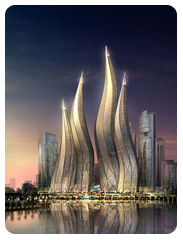 PHOTOGRAPHY PHOTOGRAPHY
Film is readily available, so too are processing facilities
and colour prints are produced in record time. Ask permission
before photographing people in general. Avoid photographing
Muslim women and do not photograph airports, docks,
telecommunications equipment, government buildings,
military and industrial installations.
TIME
The UAE is four hours ahead of GMT. The time does not
change during the summer. This means that there is a
three hour difference between UK and UAE local times
in summer and a four hour difference in winter.
ELECTRICITY
Domestic supply is 220 volts. Sockets suitable for three-pin
13 amp plugs of British standard design are the norm,
however it is a good idea to bring an adapter with you
just in case. Adapters can be purchased in local supermarkets.
Appliances purchased in the UAE will generally have
two-pin plugs attached.
WEIGHTS AND MEASURES
The UAE uses the metric system, although British and
US standard weights and measures are understood.
CLOTHING
Lightweight summer clothing is ideal with a wrap, sweater
or jacket for cooler winter nights and air-conditioned
premises. Although the dress code in the UAE is generally
casual, guests in the larger hotels do tend to dress
more formally in the evening. Since you are visiting
a Muslim country, bikinis, swimsuits, shorts and revealing
tops should be confined to beach resorts.
Women are usually advised not to wear short skirts and
to keep their shoulders covered. Note that in Sharjah
women are prohibited from wearing swimsuits on public
beaches.
TOILETS
Most shopping centres, public gardens, museums etc have
clean, well-maintained public toilets. Public toilets
in souqs and bus stations are usually just for men.
Outside of the cities, you can find public toilets at
restaurants and petrol stations, however they may not
be in good condition and will generally lack toilet
paper.
FOOD AND WATER
The standard of food hygiene and water quality is extremely
high, especially in all of the larger centres, as is
evidenced by the Which survey. You should take the time
to investigate conditions in smaller cafés in remote
areas, although again standards are usually good. Raw
salads and shawarmas (meat cooked on a spit and served
in a pittta bread sandwich) are to be avoided if you
have any doubts.
Water is usually produced by desalination so it is normally
safe to drink, nevertheless you may prefer the taste
of bottled water. In any case it is advisable to drink
plenty of water in the heat so carry a bottle with you
at all times.
|
| |
|



